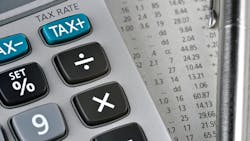Vending: The most common mistakes about sales and use tax
New entrepreneurs in the vending machine and micro market space have many responsibilities, including complying with sales and use tax. As tax professionals in the sales tax field for more than 30 years, we have focused our research and consulting efforts in recent years on the vending and micro market industry. During this time, we have observed some common misunderstandings, misconceptions and compliance mistakes made by many vending and micro market operators and owners.
This article focuses on the five most common misconceptions and mistakes related to the administration of sales tax and filing of sales tax returns. To help you avoid these pitfalls, we will explain the correct business practices or recommended approaches to complying with sales tax laws. This is intended as general information, and we recommend consulting with a tax professional or CPA for specific questions regarding your situation.
1. Register to collect sales tax for your vending business
Vending machine owners are defined as retailers, and they fall in the category of “unattended retail” operators. Retailers are required to register with state tax authorities to collect sales tax because they, by definition, have established the obligation to remit sales tax on taxable vending machine sales. This registration requirement is established by each taxing jurisdiction, typically at the state level but sometimes at the county, city or local level.
In addition to registering to collect sales tax, vending machine owners in most states are required to obtain a license or permit to operate their machines. The owner of a micro market also is considered to be a retailer and required to register with the applicable taxing authorities for the collection of sales tax.
Once registered, the vending machine owner is required to calculate sales tax on all vending transactions. Unless explicitly excluded by the tax authority, this sales tax amount is included in the selling price from the sold amount.
2. How resale exemptions work for the vending channel
Many vending machine owners misunderstand how to utilize resale exemption certificates to support the tax-free purchase of products that will be sold and distributed from vending machines.
All state tax authorities have tax laws that allow retailers the ability to purchase products exempt from sales tax when buying products that will be resold to their customers. All states provide some form of resale exemption certificate that is used by retailers to purchase products exempt from sales tax.
We have also observed that many vending machine owners mistakenly believe that if they pay sales tax on products when purchased, they do not have to calculate and remit sales tax when the product is sold via the vending machine. This is not correct and could result in a sales tax assessment by the tax authority.
For example, if an owner in New Jersey buys a case of soda (24, 12 oz cans of soda), soft drinks are taxable; therefore, the sales tax on this case is $1.59 ($13.28 * 6.625%) when purchased without a resale exemption certificate. If the 24 cans of soda are sold from a vending machine for $1.50 each, the total sales tax amount to be paid to the New Jersey tax authority is $1.67. The state of New Jersey — like many states — has a specific sales tax calculation formula that is used to determine the amount of sales tax that is included in the total sales amount.
It is important to avoid double taxation: paying sales tax on the purchase as well as the sales tax amount that is associated with the actual sale of the product from the vending machine.
3. The taxability of products sold varies by retailer
Generally, all products sold through a vending machine are taxable, including food that is exempt when sold from a grocery store. A number of states have specific regulations related to which products sold through a vending machine are subject to sales tax based on the type of product that is sold (i.e., soda, juice, snacks, candy, gum, salad, sandwich, etc.). The taxability of these products can vary by state depending upon the ingredients. For example, juice that contains less than 10% natural juice is taxable in many states, but this taxability varies based on the actual natural juice concentration.
The definition of food includes some candy unless the candy does not include flour, which can change a product from exempt to taxable. If a snack food (i.e., pretzels, peanuts, popcorn, etc.) is covered with chocolate or caramel, then a non-taxable snack becomes taxable because the snack is defined as candy in some states.
A common misconception is that the taxability of food and beverages sold by a grocery or retail store is the same when sold from a vending machine. This is the wrong practice to follow. Many states treat the sale of food and beverages from vending machines differently compared to the sale of the same product from a grocery store.
4. Understand tax calculations for vending sales
Applying the correct tax calculation of sales tax to vending machine sales can be complicated because the sales tax rate that should be used to perform the calculation is based on the location of the vending machine.
A common mistake that vending machine owners have made when performing the calculation is to use the sales tax rate of the home office or storage location of inventory, which is incorrect. For purposes of calculating the sales tax, the tax authorities will define the place of business to be the actual location of the vending machine. If the machine is moved to a new location, then the sales tax rate that should be used is based on the new location.
For example, suppose a vending machine owner in Florida has a business headquarters in Tampa and manages vending machines in 5 different cities and 3 different counties. The sales tax calculation will be different for each location because the sales tax rates of the counties are different. The combined tax rate related to each location will affect the calculation of sales tax for food and beverages.
Many other states have similar sales tax calculation and reporting requirements that are based on the location of the vending machine or micro market.
5. Filing tax returns for your vending business
The sales tax calculation complexities often transfer to the preparation and filing of the sales tax returns. Each state has its own format regarding how gross sales, taxable amount, exempt amounts and the tax collected need to be reported. States with local tax rates tend to be more complex because they require the taxes to be reported by location of the machine, which requires that sales values and associated exemptions and sales tax be reported by location. Approximately 60% of the states have local sales tax rates and require the reporting of sales taxes to be properly reported to the local taxing authorities in addition to the state. Some states such as Alabama and Colorado administer the collection of sales tax, which requires multiple tax returns to be filed within the same state.
When vending machines are moved into new taxing locations, it is the owner’s responsibility to notify the tax authority that the location of the machine has moved, which may require a new certificate or sales tax license.
Recordkeeping related to the sales tax returns that have been filed is very important as they can be reviewed and examined by the tax authority during a sales tax audit. The average statute of limitations for sales tax is three years; therefore, owners should plan on keeping copies of tax returns and support documents for a minimum of three years. This record retention requirement can vary by state if the statute of limitations is greater than three years.
About the Author

Daniel O’Rourke, JD/CPA
Daniel O’Rourke, JD/CPA, is the COO and senior vice president of compliance for Tacs LLC. Dan has more than 30 years of experience in the application of sales tax and tax technology. He has a deep level of expertise in state and local tax legislation as well as managing global indirect tax within enterprise-level resource plans (ERPs). He can be reached at [email protected] or 630-240-1698.

Scott Walters
Scott Walters is the co-founder and CEO of Tacs LLC. Scott has worked for over 30 years with a focus on sales and use tax. He has extensive experience in the implementation of tax technology to simplify the accounting process. Scott’s background includes multiple roles at leading tax technology companies as well as a director at the Tier 1 accounting and consulting firm PWC. He can be reached at [email protected] or 865-304-3212.
